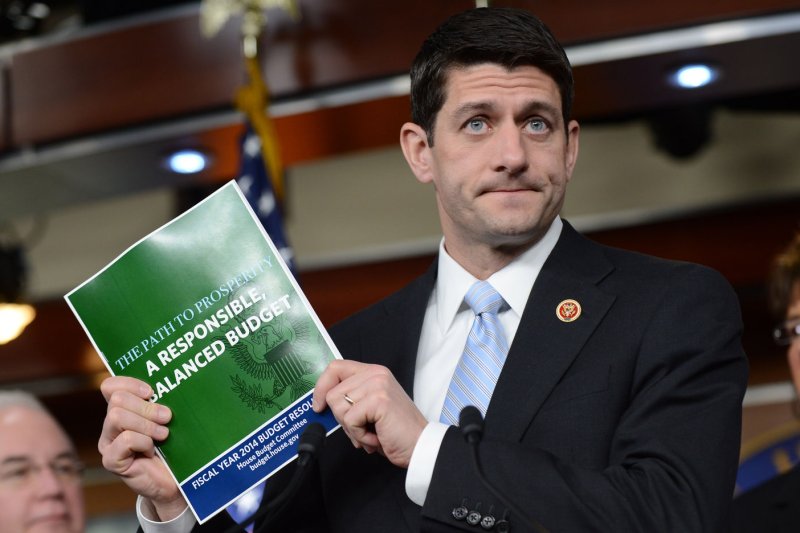Chairman of the House Budget Committee Paul Ryan. UPI/Kevin Dietsch |
License Photo
WASHINGTON, April 30 (UPI) -- Paul Ryan pitched another battle Tuesday in his ongoing war against the American War on Poverty Wednesday, blaming President Lyndon Johnson's 50-year-old program for making things worse for the nation's poor.
The Wisconsin Republican, who also authored the House-passed 2015 budget that includes broad cuts to Medicaid, food stamps, and other traditional programs benefitting the poor, held a hearing of the House Budget Committee with the stated goal of finding new ways to fight poverty. While the budget is unlikely to ever be signed into law, many of the social safety net programs targeted in Ryan's plan will likely see some cuts in the eventual appropriations process.
Ryan's committee has held two previous hearings on the subject, and in early March, the committee released a report deeply critical of both the level of spending on existing programs and their effectiveness.
"Right now, the federal government spends $800 billion a year on 92 different programs to fight poverty," Ryan said at Wednesday's hearing. "Yet the official poverty rate is the highest in a generation. And over the past three years, deep poverty has been the highest on record."
The hearing got to the heart of the deepest divisions between a Republican party that favors individual responsibility and improvement-by-bootstrap and Democrats who believe the American dream should come with a safety net.
Two of the witnesses testifying, Bob Woodson, the founder of the Center for Neighborhood Enterprise, and Bishop Shirley Holloway, the founder of House of Help City of Hope, espoused similar ideas in how to help lift troubled people out of dire economic straits. Both Woodson and Holloway's programs focus on rehabilitating people whose "self-destructive behavior and... serious character deficits" contributed to their financial problems.
"Poverty is a state of mind," Holloway said. "Somebody must deal with the mindset. You can put money at it, but money does not always take care of the issue with poverty."
Woodson, in particular, accused the federal government of indiscriminately throwing money at the problem without working to distinguish successful programs from failures, a sentiment echoed by several of the Republican members of the committee.
"We have in fact created a commodity out of poor people, where those who are providers are not responsible for producing outcomes, but they measure success by how much we spend," he said. "I think its a false dichotomy to assume that a compassionate approach to serving the poor is determined by how much we spend, and that if we reduce expenditures, that means less help for the poor."
Nearly everyone present touted some version of the belief that "the best anti-poverty program is a job," but Democrats' views differed widely on how to help the unemployed. Committee Ranking Member Chris Van Hollen, D-Md., slammed hints from his GOP colleagues that War on Poverty programs have discouraged people from working, and challenged the two witnesses' implications that the poverty and joblessness only effected people whose behaviors led them there.
"Of all SNAP [Supplemental Nutrition Assistance Program] households, 58 percent are working and those with children, you have 62 percent working," he said. "But their wage is not enough to lift them out of poverty."
Van Hollen repeatedly criticized both the Ryan budget and the House's failure to bring up for a vote a Senate-passed measure to restart lapsed emergency unemployment insurance benefits for long-term jobless. And a third witness, Children's Defense Fund president Marian Wright Edelman, dismissed the notion that the programs were both fiscally inefficient and ineffective.
Edelman, who advocated for programs to help boost health and development of children from an early age, said that anti-poverty programs have been largely responsible for helping poor families survive, even as the economy has struggled in the past six years.
"The War on Poverty has lifted millions of children and families out of poverty," Edelman said, "and I am very concerned that 50 years later some people think the best way forwards is backwards -- trying to unravel the very investments that have had such an impact and given millions of children a news lease on life and hope for the future."
Edelman pointed to research that shows the importance of the first few years of development in a child's life, including nutrition, education, and home life, to that child's ability to grow up to be a contributing member of society.
"The poorest children with the greatest needs have the least resourced schools, and so really all along, they face an unfair playing field," she said. "We've got to break that up and make sure they get through school and are able to get a job and to have a chance at a life."
"We want the same as the other side wants, which is to get rid of the programs that don't work," said a worked-up Rep. Bill Pascrell, D-N.J. "But damn it, many of these programs do work. And many of these programs are the difference between life and death in our community."
War on Poverty: 50 Years later















